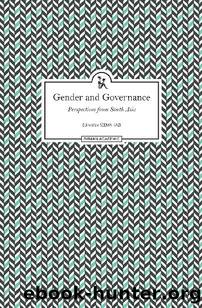Gender and Governance: Perspectives from South Asia by Seema Kazi

Author:Seema Kazi [Kazi, Seema]
Language: eng
Format: epub
Publisher: Zubaan
Published: 2019-07-22T00:00:00+00:00
According to the same report, women in Swat were barred from voting in 60 per cent of the union councils (39 union councils out of a total of 65) due to agreements between political parties. Although the elections were supposedly held on a non-party basis, political parties were fully involved in them, and those in power used the governmentâs development funds to attract votes. The PPP and ANP formed alliances with the MMA (mainly the JUI-F and JI respectively) at the local level in Swat and other Khyber Pakhtunkhwa districts. These alliances included a bar on women voting and at times contesting elections. The stated justification by JUI-F and JI was that religion forbade women a role in politics; at the same time, the PPP and ANP used the excuse of local cultural practices as justification for denying women the right to political participation. Thus, even before the Taliban takeover, secular progressive parties such as the ANP and PPP were as complicit as the religious right in denying women the right to political participation at the grassroots level. In effect, all political parties circumscribed womenâs role in the political domain, making women politically irrelevant by the time of the rise of the Taliban.
Womenâs Journeys in Local Government
Women pointed out that male support from family members was often pivotal. Almost all women said that they would not have been able to contest and meet their responsibilities had the men not supported them and stood by them in the face of opposition. Women councillors received both moral and financial support from their families. Marjan Kaleem explained, âOften women who came to attend meetings from the mountains would be accompanied by their husbands. They did this willingly. They would leave their children behind and the women in the extended family would look after them.â37 Although womenâs awareness of their right to vote was emphasized, it appeared to be tied not only to the womanâs age (young women were not allowed or encouraged to vote) but also to the level of conservatism in her family. In the latter context, it appeared to be more of an issue of the outlook of male family members rather than of economic class.
In all interviews of women ex-councilors, respondents subscribed to the collaborative model of political engagement vis-Ã -vis men, and preferred to either go along with their advice or sometimes convince them otherwise, avoiding confrontational situations. Our conversations indicated that political participation and contesting elections were not acts of defiance against family patriarchies, but in fact were made possible through family backing and support. This raises an interesting point, because in the literature on womenâs rights in Pakistan, the family structure is understood to collude with wider societal patriarchies to continually reproduce womenâs subordination. Yet in the case of allowing women to contest elections, it is evident that families in general and male relatives in particular were willing to risk social opprobrium for anticipated gains, whether the incentives were support, personal benefits or collective returns. This is indicative of porous social spaces.
Download
This site does not store any files on its server. We only index and link to content provided by other sites. Please contact the content providers to delete copyright contents if any and email us, we'll remove relevant links or contents immediately.
| General | Men |
| Women in History |
Cecilia; Or, Memoirs of an Heiress — Volume 1 by Fanny Burney(31331)
Cecilia; Or, Memoirs of an Heiress — Volume 3 by Fanny Burney(30933)
Cecilia; Or, Memoirs of an Heiress — Volume 2 by Fanny Burney(30889)
The Great Music City by Andrea Baker(21262)
We're Going to Need More Wine by Gabrielle Union(18072)
Bombshells: Glamour Girls of a Lifetime by Sullivan Steve(13107)
Pimp by Iceberg Slim(12929)
All the Missing Girls by Megan Miranda(12746)
Fifty Shades Freed by E L James(12448)
Norse Mythology by Gaiman Neil(11880)
Talking to Strangers by Malcolm Gladwell(11874)
Crazy Rich Asians by Kevin Kwan(8347)
Mindhunter: Inside the FBI's Elite Serial Crime Unit by John E. Douglas & Mark Olshaker(7833)
The Lost Art of Listening by Michael P. Nichols(6469)
Enlightenment Now: The Case for Reason, Science, Humanism, and Progress by Steven Pinker(6405)
Bad Blood by John Carreyrou(5766)
The Four Agreements by Don Miguel Ruiz(5510)
Weapons of Math Destruction by Cathy O'Neil(5034)
We Need to Talk by Celeste Headlee(4868)
